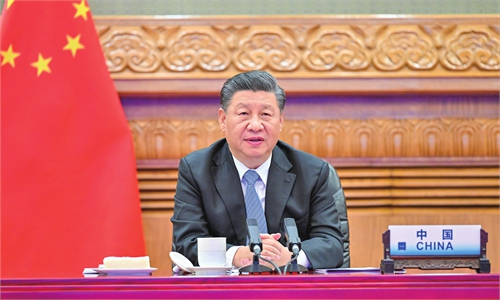
Passengers and police officers are seen at Glasgow Central train station in Glasgow, Scotland, the United Kingdom on Oct. 30, 2021. The 26th United Nations Climate Change Conference of the Parties (COP26) is scheduled from Oct. 31 to Nov. 12 in Glasgow, Scotland. This is the first of its kind since the Paris Agreement came into force.Photo:Xinhua
The 26th UN Climate Change Conference (COP26), which will host crucial negotiations in Glasgow over the coming two weeks, is being hyped as the world's last chance to keep climate change from escalating out of control.
It is at the climax of the Glasgow hype that British Prime Minister Boris Johnson warned on Sunday after the G20 leaders' summit that "if Glasgow fails, then the whole thing fails."
While many Western media outlets claimed the COP26's success hinges on whether the US and China could agree on climate change cooperation, which will set the tone for the future climate action, the US is actually the key to the outcome of the Glasgow conference.
Although China is said to be the world's largest emitter of greenhouse gases, the US has actually released more carbon dioxide emissions than any other country in the world since the dawn of the industrial revolution, and is responsible for the largest share of past emissions. Moreover, from the perspective of a country's per capita emissions, the US' per capita emission is much higher than China's.
The citizens of developed countries have been enjoying the benefits of industrialization at the expense of the environment. When they demand the developing countries stop their industrial development to meet the climate targets, debate is sure to ensue.
It is conceivable that such a debate between the world's two largest economies will be more acute, but that's even not the biggest obstacle to the climate talks between China and the US.
Even though the Glasgow conference is being billed as the world's last chance, it seems that the US still cannot focus only on its climate goals without being distracted by other geopolitical issues, and that's the crux why the talks between China and the US will be tough.
The US apparently wants to take the opportunity at COP26 summit to show the world how it is regaining its leadership role. Because if it can pressure China to accept a radical emissions reduction target, it would be a perfect exemplification of its global influence.
Despite this, the US has repeatedly launched attacks on China's human rights and other issues. It has stepped up crackdown on Chinese tech companies while continuing playing the "Taiwan card" to contain China's rise.
The overall US policy toward China is so wicked and arrogant that it is impossible for China to see any potential to have fair negotiation amid the tensions.
Moreover, there is widespread skepticism toward how the Biden administration could ensure the fulfillment of their climate promised. So far, Biden's $1.75 trillion budget plan focusing on climate agenda and other issues is facing great headwind at home. Given the former Trump administration's inaction on climate change, US' credibility will be questioned if the Biden administration cannot convince the global community about its commitment.
In this sense, if the US intends to use the COP26 summit to suppress China, it is doomed to fail. And if the Glasgow meeting fails because of geopolitical posturing by the Biden administration, the US is to blame.

Passengers and police officers are seen at Glasgow Central train station in Glasgow, Scotland, the United Kingdom on Oct. 30, 2021. The 26th United Nations Climate Change Conference of the Parties (COP26) is scheduled from Oct. 31 to Nov. 12 in Glasgow, Scotland. This is the first of its kind since the Paris Agreement came into force.Photo:Xinhua
The 26th UN Climate Change Conference (COP26), which will host crucial negotiations in Glasgow over the coming two weeks, is being hyped as the world's last chance to keep climate change from escalating out of control.
It is at the climax of the Glasgow hype that British Prime Minister Boris Johnson warned on Sunday after the G20 leaders' summit that "if Glasgow fails, then the whole thing fails."
While many Western media outlets claimed the COP26's success hinges on whether the US and China could agree on climate change cooperation, which will set the tone for the future climate action, the US is actually the key to the outcome of the Glasgow conference.
Although China is said to be the world's largest emitter of greenhouse gases, the US has actually released more carbon dioxide emissions than any other country in the world since the dawn of the industrial revolution, and is responsible for the largest share of past emissions. Moreover, from the perspective of a country's per capita emissions, the US' per capita emission is much higher than China's.
The citizens of developed countries have been enjoying the benefits of industrialization at the expense of the environment. When they demand the developing countries stop their industrial development to meet the climate targets, debate is sure to ensue.
It is conceivable that such a debate between the world's two largest economies will be more acute, but that's even not the biggest obstacle to the climate talks between China and the US.
Even though the Glasgow conference is being billed as the world's last chance, it seems that the US still cannot focus only on its climate goals without being distracted by other geopolitical issues, and that's the crux why the talks between China and the US will be tough.
The US apparently wants to take the opportunity at COP26 summit to show the world how it is regaining its leadership role. Because if it can pressure China to accept a radical emissions reduction target, it would be a perfect exemplification of its global influence.
Despite this, the US has repeatedly launched attacks on China's human rights and other issues. It has stepped up crackdown on Chinese tech companies while continuing playing the "Taiwan card" to contain China's rise.
The overall US policy toward China is so wicked and arrogant that it is impossible for China to see any potential to have fair negotiation amid the tensions.
Moreover, there is widespread skepticism toward how the Biden administration could ensure the fulfillment of their climate promised. So far, Biden's $1.75 trillion budget plan focusing on climate agenda and other issues is facing great headwind at home. Given the former Trump administration's inaction on climate change, US' credibility will be questioned if the Biden administration cannot convince the global community about its commitment.
In this sense, if the US intends to use the COP26 summit to suppress China, it is doomed to fail. And if the Glasgow meeting fails because of geopolitical posturing by the Biden administration, the US is to blame.



